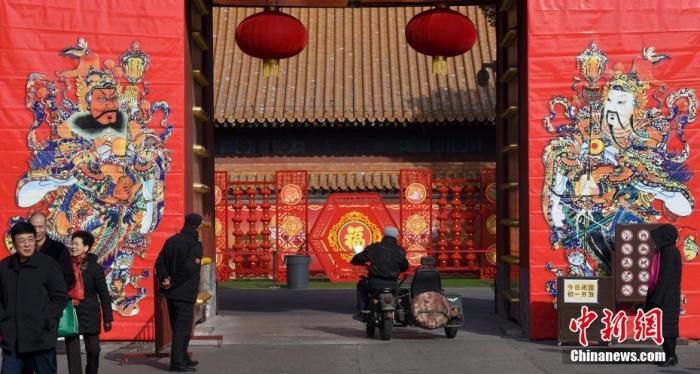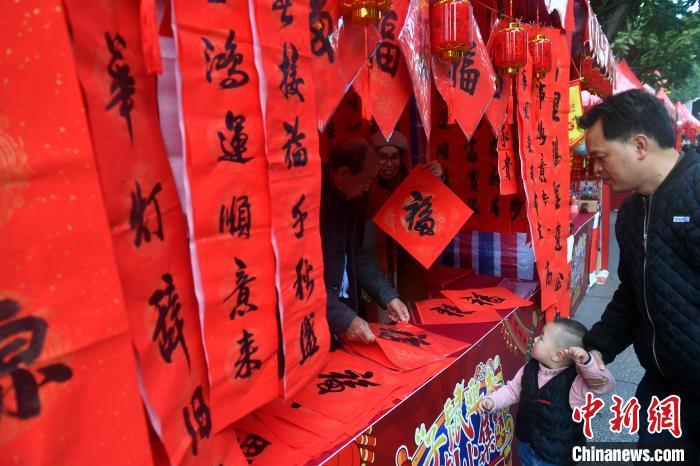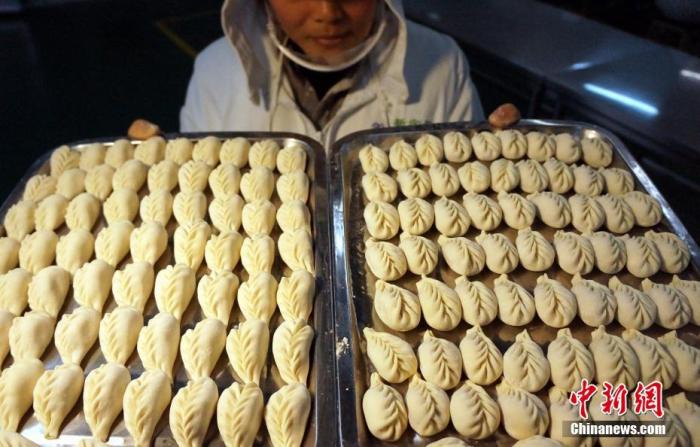When it comes to New Year’s Eve, what comes to mind? Have a delicious jiaozi, eat the warmth of the New Year’s Eve, or stick Spring Festival couplets and window grilles?
"In the sound of firecrackers, the old year is over, and the wintersweet smiles in the spring." In fact, its connotation is far from being as simple as a New Year’s Eve dinner. In the folk, "Chinese New Year" is a time period. From the early years and even the Laba Festival, people prepare new year’s goods, clean houses … and are busy welcoming the New Year. New Year’s Eve is the first "highlight".

Data Map: On the Lunar New Year’s Eve, the entrance of ditan park in Beijing was decorated with large door gods and red lanterns. China News Service reporter Hou Yushe
The Legend and Origin of New Year’s Eve
New Year’s Eve is also called New Year’s Eve, New Year’s Eve, Big Dark Day and so on. In most cases, there are thirty days in December of the lunar calendar, so it is also called New Year’s Eve and New Year’s Eve. When there is a small moon in December, the New Year’s Eve will become the 29th, and some areas will be renamed Erjiu.
Many people have done textual research on the meaning of the name New Year’s Eve. Literally, the original meaning of the word "except" is "go", which is extended to "easy", that is, alternating; The original meaning of the word "evening" is "sunset" and extended to "night", which vividly illustrates the alternation of the old year and the new year.
It is said that there was a monster named "Xi" in ancient China, which was particularly fierce and often hurt human beings. Until one day, a child named Nian told everyone the way to get rid of the evening beast: it was afraid of red, fire and explosion.
According to the method taught by the children, everyone really drove away the evening beast. To celebrate, people put on new clothes and hats one after another and went to their relatives and friends’ homes to congratulate them. The day when Xi was driven away in 2008 was called "New Year’s Eve".
However, according to "Lu Chunqiu Ji Dong Ji", the ancients used drums to drive out "the ghost of plague" on the day before the New Year. This is another way of saying the origin of "New Year’s Eve".

Data Map: The picture shows people choosing Spring Festival couplets. Photo by Lu Ming
Stick grilles, Spring Festival couplets … The taste of the year is also in it.
In the early morning of New Year’s Eve, many families will get up early and put up Spring Festival couplets at the gate. Spring Festival couplets are also called spring stickers, peach symbols, etc. The characters are neat and dual, and they simply express their expectations for the New Year.
It is said that the custom of posting Spring Festival couplets in the New Year originated in the Song Dynasty and became popular in the Ming Dynasty. In the Qing Dynasty, Spring Festival couplets became both exquisite and artistic. Liang Zhangju’s monograph "Poems on Spring Festival couplets" discussed the origin of couplets and the characteristics of various works.
There are many kinds of Spring Festival couplets, which can be divided into frame pairs, spring strips and bucket squares according to the places of use. The "frame pair" is attached to the left and right door frames, and the "spring strips" are attached to corresponding places according to different contents, and so on.
In the folk, people also like to stick various paper-cuts on the windows, that is, window grilles. At the same time, the word "Fu" is pasted on the door, wall and lintel. Sometimes, the word "blessing" will be pasted upside down, indicating that "the blessing has fallen (arrived)"
In addition, the word "Fu" can also be finely carved into various patterns, such as longevity, longevity peach, carp jumping over the dragon gate, abundant grains, dragons and phoenixes, and so on.
A New Year’s Eve dinner, a reunion year.
New Year’s Eve is extremely important for China people. In addition to welcoming the old and welcoming the new, it is one of the customs at this time to have a reunion dinner and keep the old.
Liang Shiqiu also said in the article that the Chinese New Year needs to be in his hometown to have a taste. "It’s bleak to travel, and there is only a sigh in the next year. How can there be a little joy?"

Data Map: jiaozi. Photo by Wang Yuyang
In the past, some dishes for New Year’s Eve were prepared a few days before the Chinese New Year. In the north, jiaozi on the first day of New Year’s Eve is also wrapped up at 30 nights, and the sounds of chopping vegetables and meat are woven together with laughter to form a cheerful movement on New Year’s Eve.
On New Year’s Eve, a table was filled with rich New Year’s dishes, and the whole family sat together to have a reunion dinner, enjoying both delicious food and a happy atmosphere for the New Year.
Generally speaking, there will be hot pot on the dining table, which symbolizes the prosperous days; In some places, you must eat fish. "Fish" and "Yu" are homophonic, symbolizing that "Jiqing has more than enough", and also pinning the good wish of "having more than every year".
There are these taboos in the old days, and I look forward to a smooth new year.
In order to express the meaning of getting rid of the old and welcoming the new, there were many taboos on New Year’s Eve in the past. For example, don’t say unlucky words such as ghost, death and murder, don’t break dishes, don’t speak ill words, and don’t spill sewage.

Data Map: Citizens in Huludao, Liaoning Province enjoy a sumptuous New Year’s Eve dinner with their families at home. China News Agency issued by Haiyang Photo
Especially at the New Year’s Eve, if some tea fruits are finished, you should say "I’m happy" or "too much" instead of saying "no" … These auspicious words are the "homework" that people must do, and adults should teach their children to say them, otherwise the New Year will not be smooth.
Before the New Year’s Eve dinner, many families will prepare offerings to worship their ancestors. After Zuling is invited, no one can occupy the seats on both sides of the altar; Of course, we must not make noise or swear, otherwise we will disrespect our ancestors.
Nowadays, with the passage of time, many taboos on New Year’s Eve have been broken, and the old customs are developing in a more scientific and healthy direction. But the only thing that remains unchanged is people’s attachment to their families: it is also the most rare happiness for the whole family to spend the whole year together. (Reporter Shangguan Yun)